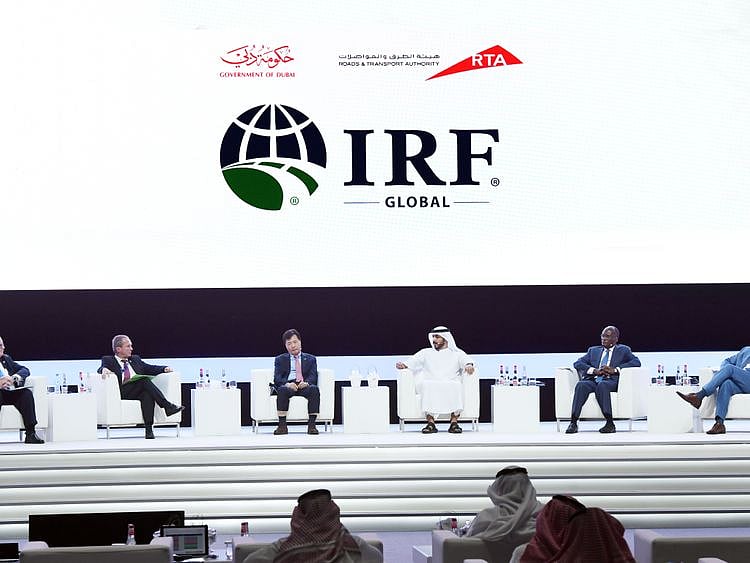IRF session examines 'Transport Beyond COVID-19'
Roads and marine transport proved critical for community during pandemic, experts say

Also In This Package
Dubai: The 18th International Roads Federation (IRF) World Meeting and Exhibition recently conducted a session titled ‘Transport Beyond COVID-19 — Agile Policies of 21st Century’. The session was moderated by Dr Bill Sowell, senior vice-chairman of IRF; Sheikh Nasser Majid Al Qasimi, Undersecretary for the Infrastructure and Transport Sector at the Ministry of Energy and Infrastructure; James Macharia, Cabinet Secretary for Transport, Infrastructure, Housing and Urban Development in Kenya; Paul Ajegba, Director of Michigan Department of Transportation; Dr Sung Hwan Kim, President of Road Engineering Association of Asia and Australasia; and Professor Claude Van Rooten, President, PIARC.
At the start of the session, Professor Claude van Rooten made an introductory presentation on the Association of Roads and its online publications, which are available for free to the public through the Association’s website.
Professor Van Rooten explained that the association had prepared a response team to gather experiences around the world. It released information that include objectives focused on preparedness and adaptation and how to prepare for upcoming crises while dealing with the pandemic itself. He also reflected on the importance of developing a system through which risks are identified and assessed on a priority basis, before developing response plans and finally achieving integration.
In his speech, Al Qasimi said: “Thanks to a system of resilient legislation, The UAE has demonstrated the ability and efficiency to cope with global changes and emergency conditions forced by the COVID-19 pandemic. It has made unremitting efforts to confront the pandemic through continuing land and marine transport system, which represented the lifeline of society at a time where other transportation means were disrupted. It was evident to everyone that mobility systems have been hit hard by the pandemic as a result of closures, social distancing, hygiene and sterilisation requirements, and a significant drop in demand for personal mobility given the measures taken to limit the spread of the epidemic. Such a situation contributed to major complications in operating land and sea transport. And this will form the basis of future legislation and policies for this vital sector.
“We are on the cusp of overcoming the epidemic. With the reopening of cities and the return of life to normal, we are at a crossroads to transform the COVID-19 crisis into real opportunities. It requires crisis management from the perspective of corporate agility, resilient economic performance and end-to-end digitisation of operations. It also entails re-planning the transport strategy and re-designing transport projects to align them with the logistical changes in terms of increased land and water transport patterns. It also requires accelerating the adoption of more sustainable and flexible urban mobility policies to ensure the wellbeing of people,” added Al Qasimi.
Three variables
Al Qasimi identified three main variables that set the base for organising or reorganising land and marine transport means after the COVID-19: Building a strong relationship and proactive interaction with customers, accelerating the digitisation of services and processes to ensure priority and resilience, and developing sound crises management methods to better anticipate risks and improve the resilience of transport operations.
“The wise policy of the UAE assigned due consideration to the sustainable environment sector and the integrated infrastructure, known as logistical performance. It aims to streamline land and maritime transport sectors, and lay legislative structures for their development to achieve global supremacy in development, diversity, integration and sustainability. The UAE is aware of the importance of land and water transport and recognises the importance of storage in supporting the national economy, which is a key driver of comprehensive development. Therefore, it is keen to design pioneering initiatives and projects that support the UAE’s goals for the next fifty years, which in turn contribute to maintaining the gains over the past fifty years.”
Positive side of the pandemic
Dr Kim spoke about how the pandemic closed borders and affected the economy and mobility. He noted that the positive side of the pandemic was the improvement in air quality due to reduced pollution. Countries also realised the importance of cooperation and openness after the isolation that prevailed during the pandemic.
Macharia explained the impacts of COVID-19 in Kenya, and how the government took precautionary measures including lockdown.
“To mitigate the effects of the pandemic from an economic perspective on people, the Kenyan government decided to put forward a programme to provide food support. The transport sector came up with initiatives to renovate roads that connect cities and one of the key challenges encountered was the delivery of vaccinations to all regions,” Dr Kim added.
Also Read
Abu Dhabi: Driving a noisy vehicle or modified its engine? Be prepared to pay Dh13,000 fineAbu Dhabi launches free bus service to top attractions Dubai saved Dh210 billion worth of fuel, time from being wasted in traffic jamsSafe drivers delighted with Dh1,000 cash prizes awarded by the Tristar Goldstar contestSpeaking at the session, Ajegba said: “Michigan succeeded in adapting to the challenges of coronavirus, most notably reforming infrastructure, transporting goods and providing masks and personal protection tools. Lessons learned from the pandemic are summarised in the adaptability, development of new methodologies for investment in infrastructure and resilience to strike a balance.”
Sign up for the Daily Briefing
Get the latest news and updates straight to your inbox
Network Links
GN StoreDownload our app
© Al Nisr Publishing LLC 2026. All rights reserved.